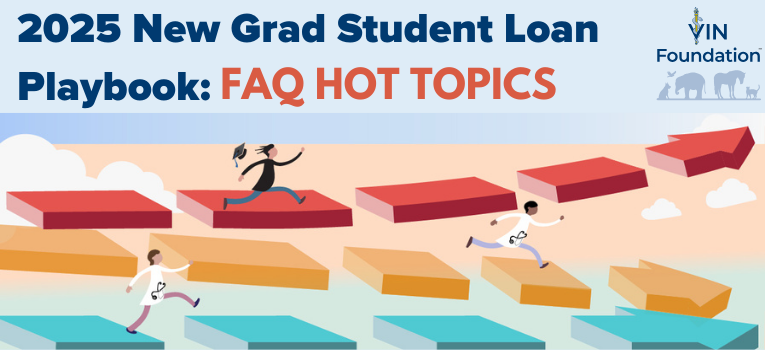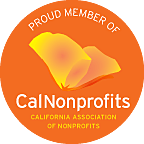What is the "New Grad Student Loan Playbook" webinar about?
The “New Grad Student Loan Playbook” is an annual webinar by VIN and VIN Foundation aimed at providing information and guidance to graduating veterinarians regarding their student loans and repayment options.
With the rapidly changing student loan landscape, each graduating class faces new and different challenges. Some of the most consequential mistakes happen during the initial phase of student loan repayment.
The most recent webinar, held on May 7th, 2025, covered topics such as whether to file a 2024 tax return, the implications of consolidating loans, choosing the right repayment plan, and whether using a signing bonus to pay down loans during the grace period is a good idea.
During the recent 2025 New Grad Student Loan Playbook webinar, there were many questions. Below are the questions and answers focused on Income-Driven Repayment (IDR) Plans:
Q: Are IDR plans accepting applications now?
A: Yes. Applications for income-driven repayment (IDR) plans are available: https://studentaid.gov/idr
The IDR plans currently available are ICR, IBR, and PAYE. Check your IDR Profile in the VIN Foundation My Student Loans tool so you know which IDR options are available for your loans.
However, for new graduates, you cannot apply for an IDR plan until your post-graduation grace period is ending. The only way to end a grace period early is to apply for a Direct Consolidation Loan and select the “Do not delay processing” option. Before you choose to consolidate your federal student loans, review the recent Consolidation FAQ and Consolidation Conundrum blog posts for more information on this complex topic for 2025 graduates.
Please note: As a result of recent rulings and the change in administrations, there is a significant backlog of IDR applications. When it is time for you to apply for a repayment plan, if you choose an income-driven plan, follow your application closely and confirm that your application has been processed accurately and before payments are due.
Q: Do we have to wait to apply until we’ve consolidated? If so, once we consolidate, how long until we can apply for IDR?
A: You do NOT need to consolidate your loans in order to apply for an income-driven repayment (IDR) plan. If you do choose to consolidate, you will apply for your repayment plan during the consolidation application. If you choose an IDR plan for your consolidated loan, then you will provide your income information at that time. See the Consolidation FAQ and Consolidation Conundrum blog posts for more information about consolidating your federal student loans.
If you do not consolidate your federal student loans, then you can apply for an IDR plan as your grace period is expiring. For example, if you graduate in May and your federal student loan grace period ends in November, submit your IDR application around September, about 60 days before your grace period expires. If you submit your application too early, it may get ignored. If you submit it too late, then you may need to request a forbearance while your application is processed.
With all of the changes happening with federal student loans in 2025, there is a lengthy backlog of IDR applications. Know that it could take longer than usual to get your application processed. Follow your application closely and ask a lot of questions until you see the outcome you are expecting.
Q: My spouse and I filed jointly. Will their income be a part of my income driven repayment plan payment?
A: Yes. If you are married and your most recently filed federal tax return was filed jointly with your spouse, then your combined income will be used to calculate your income-driven plan payment.
If you filed your most recent federal tax return separately from your spouse, then you can exclude your spouse’s income from your income-driven plan payment calculation.
Q: Is there a difference in interest rates between an income-driven plan and a time-driven plan?
A: The short answer = No. Interest rates for federal student loans are fixed for the duration of repayment. The repayment plan you choose does not affect your interest rate. However, the amount of total interest you’ll pay on your federal student loans will depend on the type of plan you choose and how repayment plays out for you.
The long answer: Interest is the amount you pay above what you borrowed. Federal student loans are more complicated because of the different ways they can be repaid. For time-driven plans, the longer you are in repayment, the more interest you will pay. With income-driven plans, the amount of interest you pay depends on whether or not you reach a zero balance before hitting forgiveness or you hit forgiveness.
One measure we can use to compare the rate of interest paid for a loan is the effective annual interest rate. If we take the projected total interest paid as a percentage of the amount borrowed and divide it by the number of years in repayment, we get the effective annual interest rate.
For example, let’s say you finish veterinary school with $220,000 in federal student loans. If we simulate your repayment using a starting income of $120,000/year increasing by 3% per year and assume a family size of 1 for the duration of repayment using IBR 2014, your total projected repayment costs might be $311,767 assuming a 30% tax on amounts forgiven and a forgiveness savings plan return of 4% per year.
In that scenario, you have paid $91,767 in interest over 20 years (amounts above what you borrowed, $311,767 – $220,000 = $91,767).
The proportion of your total interest above what you borrowed = $91,767/$220,000 = 0.417. If we annualize that by the 20 years it took you to repay that loan, your “effective annual interest rate” equals 0.417/20 * 100 = 2.09% per year.
If you instead repay that same loan over 25 years in a time-driven plan with a minimum monthly payment of $1,485, then you’ll pay $445,636 in total. The proportion of your total interest above what you borrowed in this 25-year time-driven plan is $225,636/$220,000 = 1.026. If we annualize that by the 25, your “effective annual interest rate” equals 1.026/25 * 100 = 4.10% per year.
You can use the effective annual interest rate to compare the rate of interest you’ll pay across income-driven plans, time-driven plans, or refinance offers.
Q: Do most income-driven plans lead to forgiveness?
A: All income-driven repayment plans have forgiveness as a potential outcome. However, you can also pay your student loan balance to zero before you reach forgiveness while using an income-driven. The outcome for you will depend on a number of factors: your student loan balance, interest rate, income, marital status, tax filing status, family size, state of residence, and changes to available repayment plans, provisions, and tax policy.
Use the VIN Foundation My Student Loans tool and Student Loan Repayment Simulator to see how your student loan repayment scenarios may look in the short and long term.
Q: How does the new proposed Repayment Assistance Plan (RAP) compare to IBR?
A: The Repayment Assistance Plan is a proposed income-driven repayment option that is currently making its way through Congress as part of the Budget Reconciliation process. It’s a bit too soon to compare it to IBR since we do not yet know exactly how the details will play out. However, from the information available so far, the short answer is RAP is more beneficial than IBR 2009 in many ways, less beneficial than IBR 2009 in some ways, and much less beneficial than PAYE, IBR 2014, and SAVE, which will potentially be eliminated in favor of RAP.
More information coming soon once the Budget Reconciliation process concludes…
Have more questions? Post a comment below or email [email protected].

Dr. Tony Bartels graduated in 2012 from the Colorado State University combined MBA/DVM program and is an employee of the Veterinary Information Network (VIN) and a VIN Foundation Board member. He and his wife have more than $400,000 in veterinary-school debt that they manage using federal income-driven repayment plans. By necessity (and now obsession), his professional activities include researching and speaking on veterinary-student debt, providing guidance to colleagues on loan-repayment strategies and contributing to VIN Foundation initiatives.


